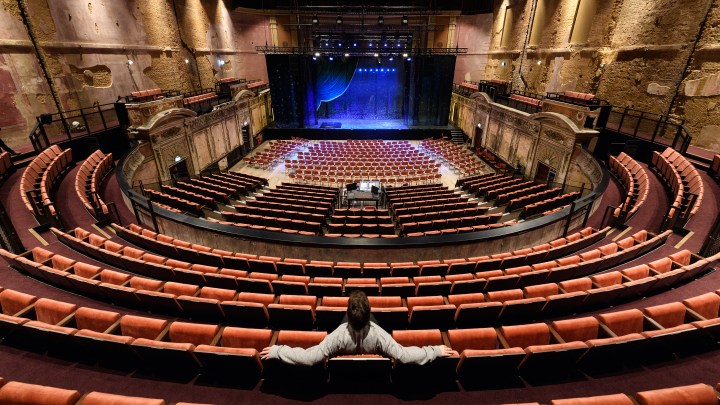
Having survived pandemic lockdown, a small British theater company takes a bow
Having survived pandemic lockdown, a small British theater company takes a bow

After 14 months of closure and disruption, Britain’s world-famous theater industry was recently permitted to reopen under the phased lifting of coronavirus restrictions. It’s still not business as usual. With social distancing rules in force, theater capacity capped at 50% and audiences required to wear face masks, it hardly makes for a relaxing night out.
The last of the remaining restrictions are due to be lifted on June 21. A dormant industry that usually employs almost 300,000 people and sells about 34 million tickets a year is getting ready to spring back to life.
At the height of the pandemic, Marketplace interviewed a small touring company, Blackeyed Theatre. As the company prepares to hit the road again, we checked in with the cast and crew to find out what it was like to wait in the wings for more than a year.

“We haven’t toured at all since March 2020. As a touring company it’s been a big blow. Big blow,” said Adrian McDougall, Blackeyed’s founder and artistic director. But he isn’t about to deliver a tale of unmitigated woe.
“I’ve never been busier, oddly enough,” he said. “I‘ve been working hard to find ways to do things differently, to adapt and engage new audiences.”
McDougall has taken his theatre company online, filming two of his productions of classics: “The Strange Case of Dr. Jekyll and Mr. Hyde” and “Jane Eyre.” The films are available on demand, have been licensed for use in schools and they provided a makeshift alternative to physical touring. After a planned trip to China was cancelled because of COVID-19, Blackeyed organized the screening of the filmed version of “Jekyll & Hyde” in a cabaret bar in Shanghai last month.

“I feel really proud that people in China have paid to go and see our work in a venue during a pandemic,” McDougall said.
And the Chinese want more. After the gothic horror of “Jekyll & Hyde,” next month in Shanghai they’ll be getting the gothic romance of “Jane Eyre.”
McDougall said the online productions haven’t made up for the loss of revenue from live touring. But along with his company’s reserves and some government money, the online offering helped the company stay afloat during the pandemic.
Meanwhile, his actors have been juggling multiple roles –– as usual.
“Actors have always been good at adapting to different situations, different work,” said Ashley Sean Cook who plays the part of Hastings Lanyon in “Jekyll and Hyde” and has just started playing the Gruffalo in another company’s open-air production of that children’s classic. Somewhat ironically, the pandemic has helped Sean Cook survive financially –– he’s been working as a door-to-door COVID-19 tester.

“At the moment I work five days a week swabbing and doing capillary bloods [tests] on people’s doorsteps. And then at the weekends I perform as the Gruffalo. So it’s a bit of a mix at the moment,” he said.
Actors were struggling to make a living from their profession long before the pandemic. According to a study by academics at Queen Mary University, London 90% of them are usually unemployed. Luke Barton, who plays Sherlock Holmes in a Blackeyed production, said the pandemic made matters a lot worse.
“All my actor friends have had to turn to other things, whether that’s delivery driving, working in supermarkets, anything like that,” Barton said. His co-star in the “Sherlock Holmes” production trained as a paramedic, and so he’s now working part-time giving COVID-19 vaccine shots.
“I’m hoping any day now that I will have my vaccine administered by Dr. Watson,” Barton laughed. “If you want anyone to administer your vaccine, it’s surely Dr. Watson.”

Barton has supported himself with part-time teaching and narrating audio books, a medium that’s boomed in the U.K. during the pandemic, providing him with plenty of work. But he cannot wait to get back to live theater.
“Acting is the best job in the world,” he said. “And nothing beats the exhilaration of being in a theater with 700 other people all collectively imagining you are that character going on that journey. So the sooner I get back on stage, the better.”
Blackeyed is due to hit the road for a nine-month comeback tour starting in September, having fared better than many other theatrical companies during the pandemic. A survey in March by two advocacy groups, U.K. Theatre and the Society of London Theatre, revealed an industry under severe financial strain due to COVID-19: dozens of groups have each lost more than a million dollars, while 16 have lost more than $7 million.
As a touring company, Blackeyed has benefited from not having a building to maintain. With a cast of only four or five actors and a crew comprising just one stage manager, its costs are also relatively low.
“We are very flexible and nimble,” said McDougall. “And even more so after COVID. No one would welcome a pandemic, but it has given us that additional string to our bow, the online offering, which makes us, in the long run, a far more resilient business.”
There’s a lot happening in the world. Through it all, Marketplace is here for you.
You rely on Marketplace to break down the world’s events and tell you how it affects you in a fact-based, approachable way. We rely on your financial support to keep making that possible.
Your donation today powers the independent journalism that you rely on. For just $5/month, you can help sustain Marketplace so we can keep reporting on the things that matter to you.











